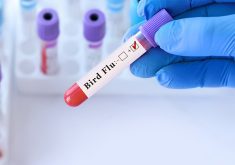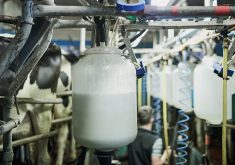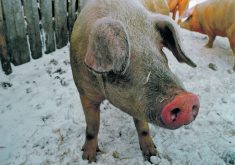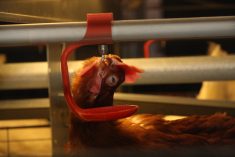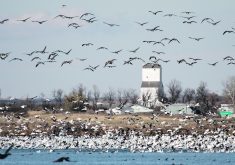Government response to the outbreak in Michigan sparks COVID-era worry as farmers resist state-mandated efforts
MARTIN, Mich. (Reuters) — Some dairy farmers are resisting Michigan’s nation-leading efforts to stop the spread of avian flu for fear their incomes will suffer from added costs.
The government’s restrictions, which include tracking who comes and goes from farms, are rekindling unwanted memories of COVID-19 in Martin and other small towns in central Michigan.
The state has two of the four known cases in humans, all dairy workers, since federal authorities confirmed the world’s first case in U.S. cattle in late March.
Read Also

New coal mine proposal met with old concerns
A smaller version of the previously rejected Grassy Mountain coal mine project in Crowsnest Pass is back on the table, and the Livingstone Landowners Group continues to voice concerns about the environmental risks.
The state has tested more people than any of the 12 states with confirmed cases in cows, according to a survey of state health departments. Testing policies vary by state.
Public health experts fear the disease has the potential to turn into another pandemic just a few years after COVID-19. As those worries mount, the acceptance and success or failure of Michigan’s proactive response is being watched by other states looking for a roadmap that goes beyond federal containment recommendations.
More than a dozen interviews with Michigan producers, state health officials, researchers and industry groups, along with preliminary data, show limited dairy farmer participation in efforts to stem and study the virus. In some cases, calls from local health officials go unanswered, money for dairy farm research is left unclaimed and workers still milk cows without extra protective gear.
Brian DeMann, a dairy farmer from Martin, said the outbreak and the state’s response recalls COVID-19. The 37-year-old believes Michigan’s rules to contain bird flu would be more widely accepted if they came as recommendations rather than requirements for farmers.
“Nobody knows if these things that we’re being told to do are going to stop it,” said DeMann, who echoed an uncertain view shared by other farmers.
“Just like 2020, people didn’t like to be told what to do.”
This spring, many U.S. dairy owners did not heed federal recommendations to offer more protective equipment to employees, according to farmers and workers.
DeMann said he did not invest in new protective gear, such as masks, for his workers because it is unclear how the virus is spreading.
About 900 permitted dairy farms dot Michigan’s countryside, with cows in open-air barns and piles of feed covered with protective tarps and old tires used as weights.
Tim Boring, Michigan’s agriculture director, said social stigma and economic concerns around infections have discouraged farmers from testing cows for avian flu in the nation’s sixth biggest milk producer.
“There’s a lot of factors that go into the concerns about farms coming forward with positive operations,” he said.
“We know this has been a challenge in Michigan.”
The state last reported an infected dairy herd on July 9, its 26th to test positive. Five other states have also confirmed cases in the past month, and about 140 herds have been infected nationally since March, according to U.S. Department of Agriculture data.
Michigan is offering farms up to $28,000 to entice those with infected herds to participate in research. More than a dozen farms have expressed interest, the state said.
The federal government is also offering financial assistance. Twelve of 21 herds enrolled in financial support from the USDA are from Michigan, according to the agency.
To boost testing, USDA launched a voluntary program in which U.S. farmers can test tanks of milk weekly for bird flu. Six farmers in six states have enrolled one herd each, but a Michigan farmer is not among them yet.
“I really would like to see that in every single herd,” said Zelmar Rodriguez, a Michigan State University dairy veterinarian studying infections.
Michigan’s agriculture department said it has up to 200 people responding to avian flu cases in poultry and cattle, including co-ordinating with the USDA on outbreak investigations. Veterinarians in other states said they tracked Michigan’s cases to assess the risks for transmission.
“Michigan is doing a good job with their diagnostics and trying to identify where the disease is,” said Mike Martin, North Carolina’s state veterinarian.
Michigan’s outbreak in cows began after an infected Texas farm shipped cattle to Michigan in March before the virus was detected, according to the USDA. Weeks later, a Michigan poultry farm also reported symptoms and tested positive. Whole genome sequencing suggested the virus spread from the dairy farm to the poultry flock.
The USDA now thinks the virus has spread indirectly through people and vehicles moving on and off infected farms.
Chickens owned by Michigan’s largest egg producer, Herbruck’s Poultry Ranch, were infected because the virus spread from cattle, said Nancy Barr, executive director of Michigan Allied Poultry Industries, an industry group.
“It’s a new threat to us,” Barr said.
Herbruck’s told the state in May it was laying off about 400 workers after avian flu decimated flocks in Ionia County. The company said in a public notice it planned to rehire employees as it rebuilds its flocks, a process that can take six months.
As of late June, Ionia County poultry farmers received $73.2 million in indemnity payments from the U.S. government for avian flu losses, the most of any county in the country that had to cull infected flocks since February 2022, according to data obtained from the USDA.
The layoffs struck fear in Ionia, a city of about 13,000 people in central Michigan with a brick-paved Main Street and mural of the Mona Lisa. Business owners said unemployed workers have less money to spend at a time when local stores already struggle to compete with Walmart and Meijer.
“I just thought, ‘oh great, here goes the store,’ “ said Jennifer Loudenbeck, owner of the Downtown Vintage Resale shop.
Alex Hanulcik, who owns a fresh fruit stand, said he knows a Herbruck’s employee who left town to find work in the southern United States after being terminated.
“I really feel for the employees,” Hanulcik said.
“They were blindsided.”
Dairy farmers said they are constantly worrying their cows may be the next to become infected, yet they are unsure exactly how to protect them.
Doug Chapin, a dairy farmer in Remus, Mich., said he held meetings with employees to inform them of the risks of the virus. He is trying to make workers wear protective eye gear, though they objected in the past because glasses must be cleaned if milk sprays on them.
“You’re thinking about it all the time,” he said about the virus.
Michigan has plans to test dairy workers for signs of previous infections with first-in-the-nation blood testing.
The state has already monitored thousands of people for bird flu symptoms using a complex contact tracing system that texts them three times daily, said Chad Shaw, health officer for the Ionia County Health Department.
However, some farmers remain reluctant to engage with local health authorities.
The Branch-Hillsdale-St. Joseph Community Health Agency began reaching out to farms generally to offer medical care for seasonal workers because of avian flu cases, said health officer Rebecca Burns. There has been little interest, she added.
“These guys aren’t used to us calling them,” Burns said.
Michigan has detected the third most infected dairy herds of any state, after Idaho and Colorado, and lost 6.5 million chickens in April alone from outbreaks on poultry farms, USDA data show.
In late April, U.S. president Joe Biden’s administration began requiring lactating cows to test negative before being shipped over state lines.
Michigan went further and in May started requiring farms to keep logs of visitors, disinfect delivery trucks that could carry the virus and take other safety steps. This month, the state began requiring negative tests for non-lactating cows to be shown at fairs.
Colorado reported the nation’s fourth human case July 3. The U.S. government awarded $176 million to Moderna to advance development of its bird flu vaccine for humans.
Two dozen companies are working on a vaccine for cattle, U.S agriculture secretary Tom Vilsack said, because about 140 herds nationally have tested positive.
“Michigan’s been the forefront on providing information, providing access to information that really is helpful,” Vilsack said.





